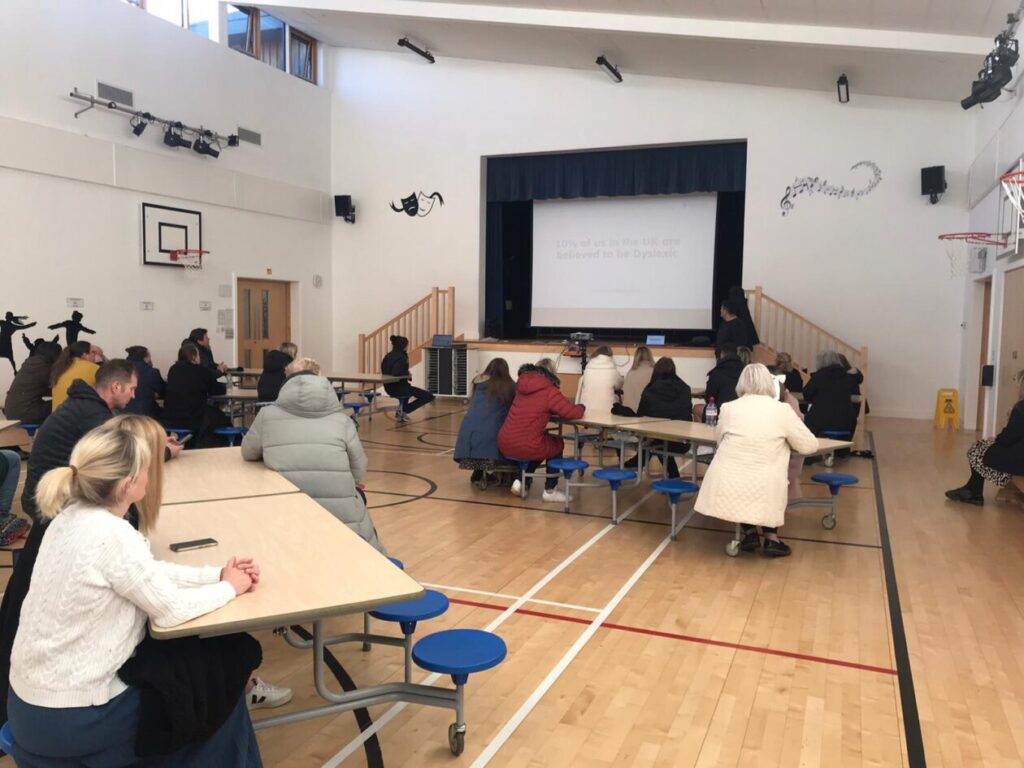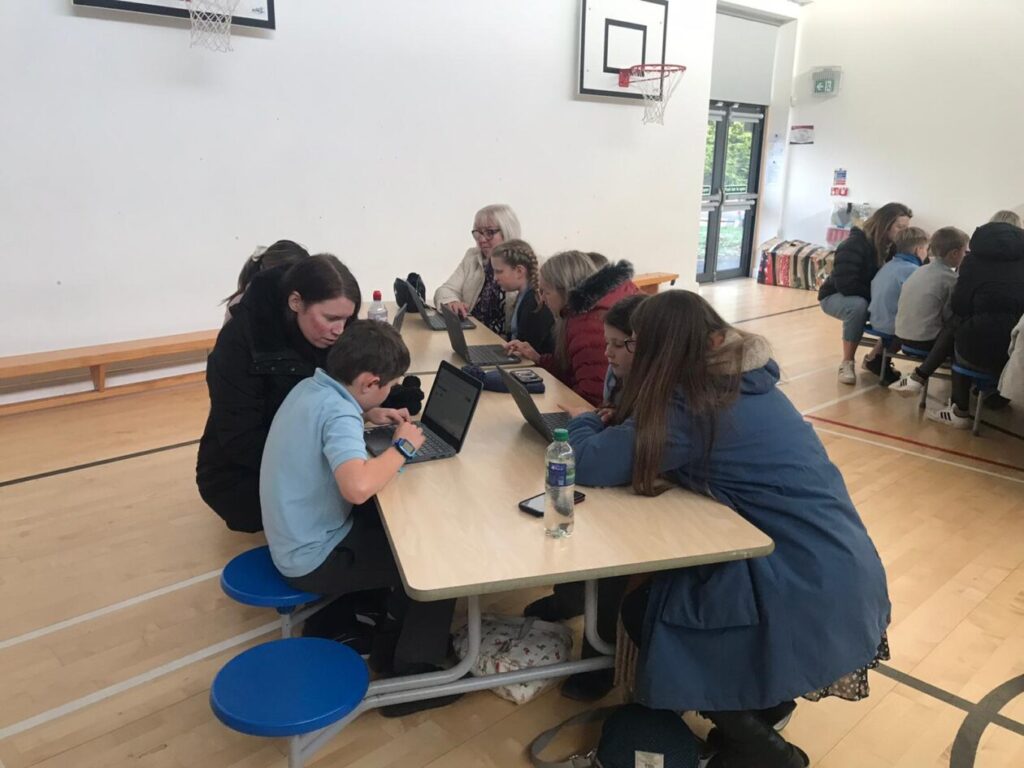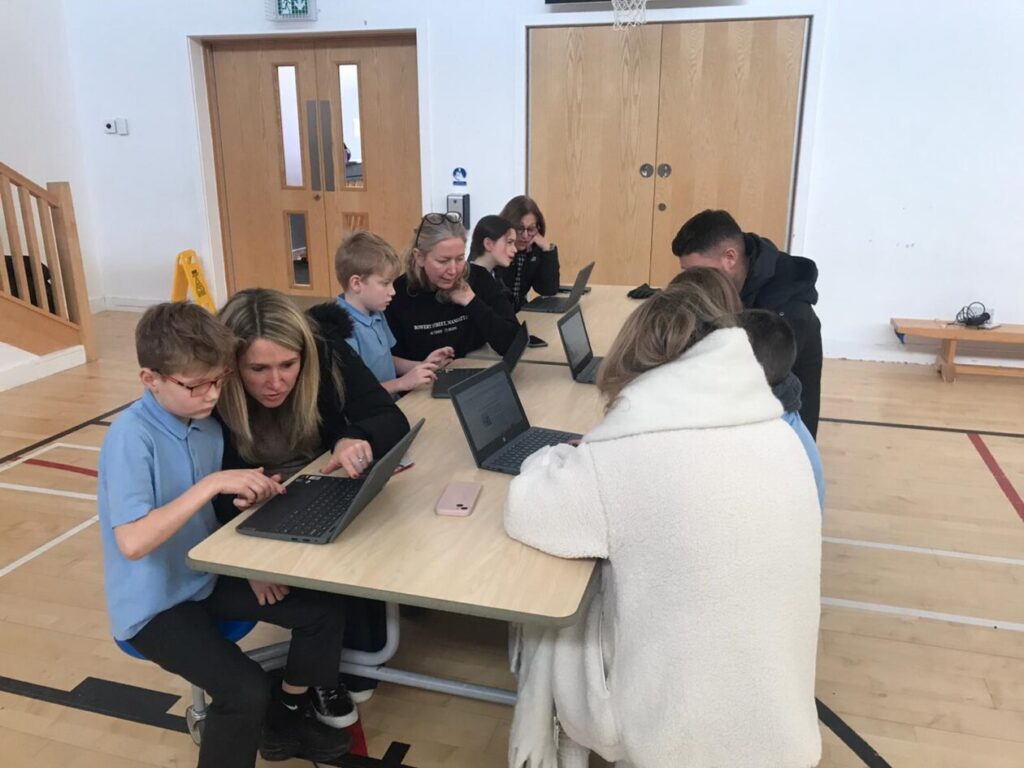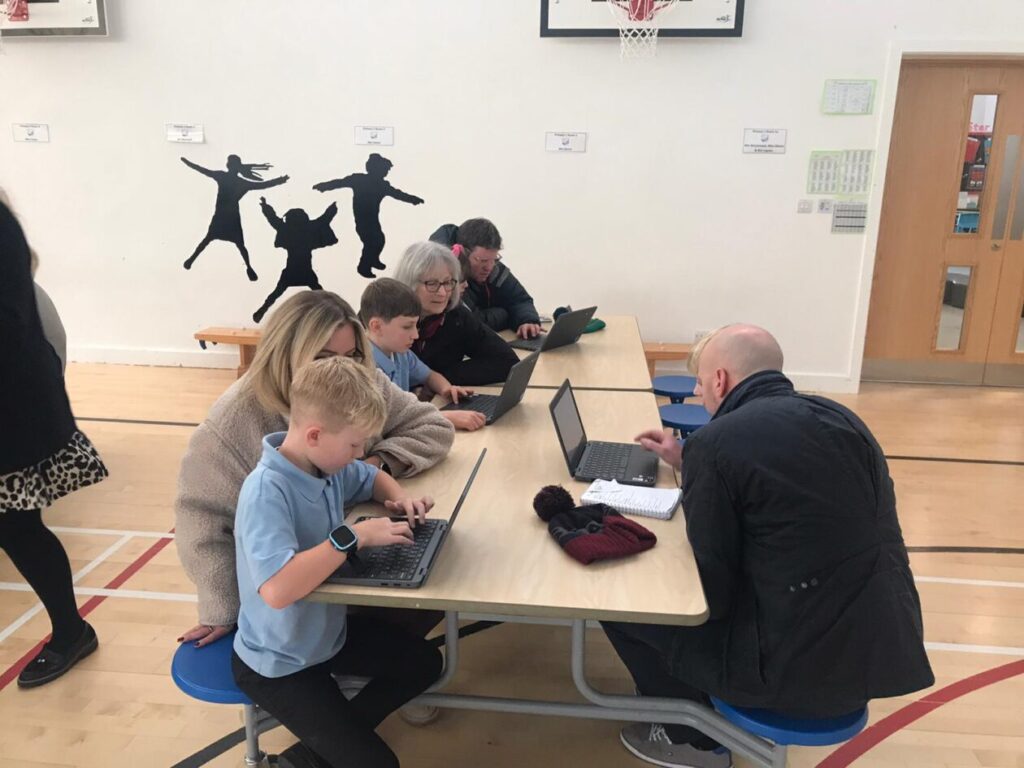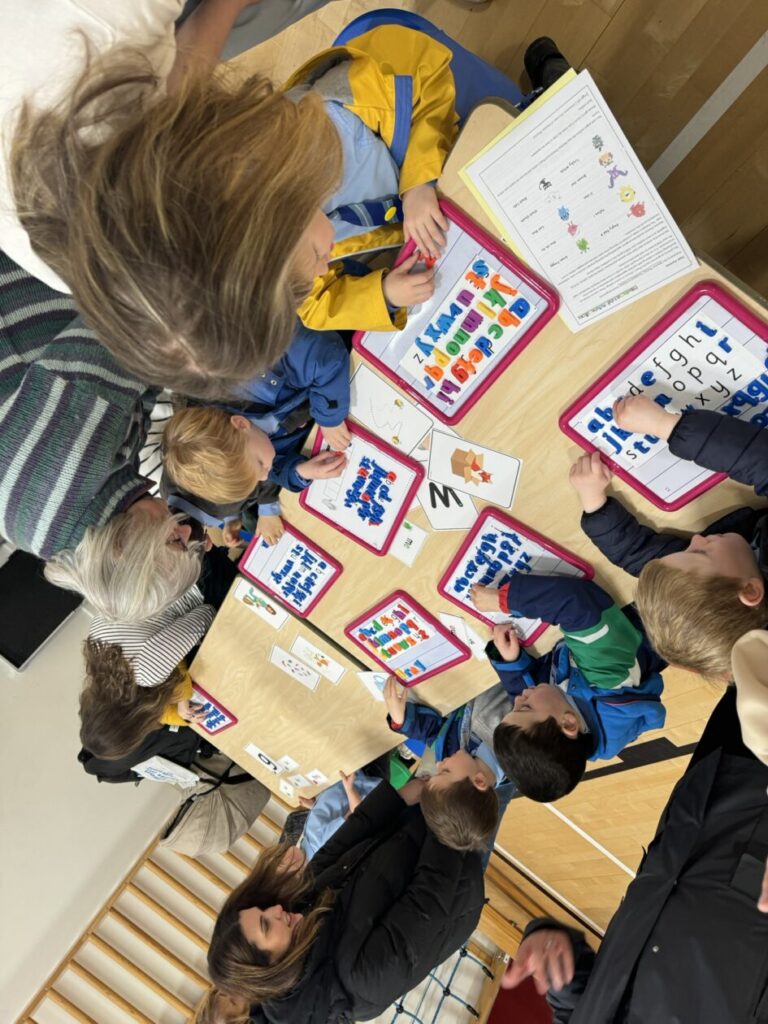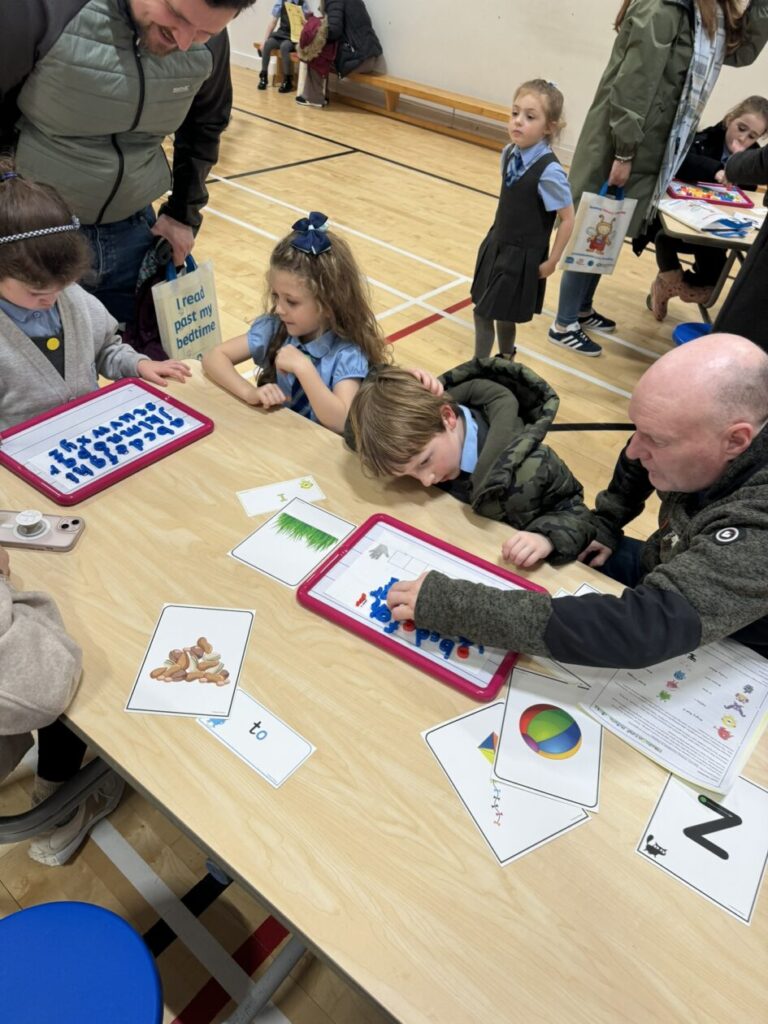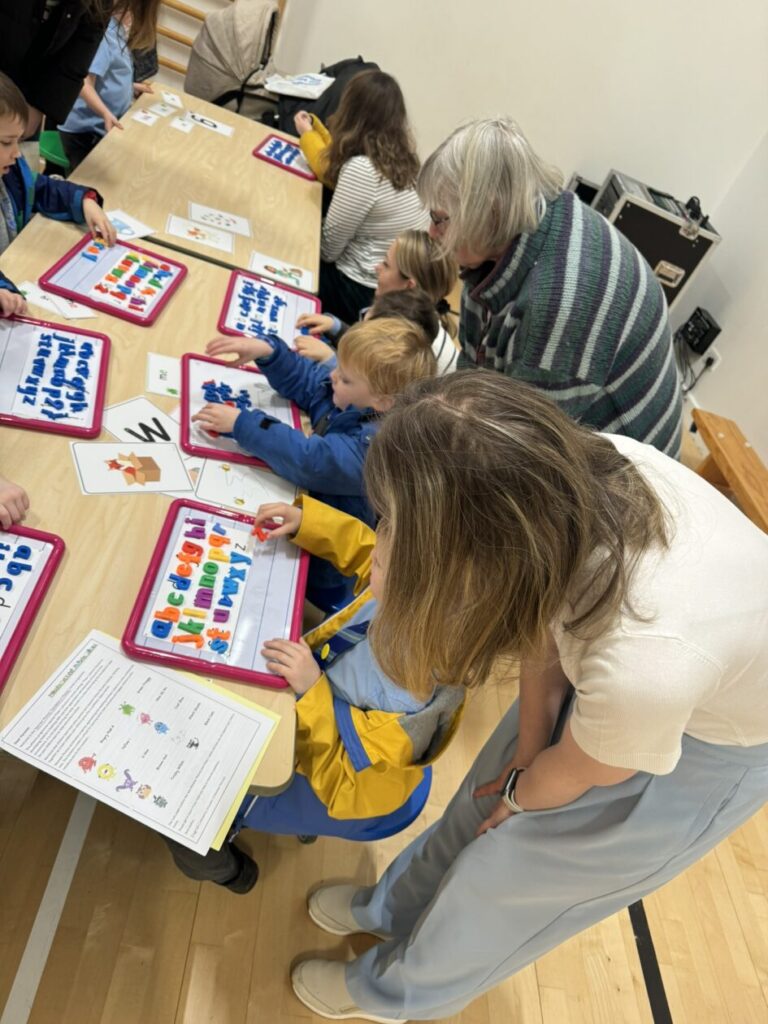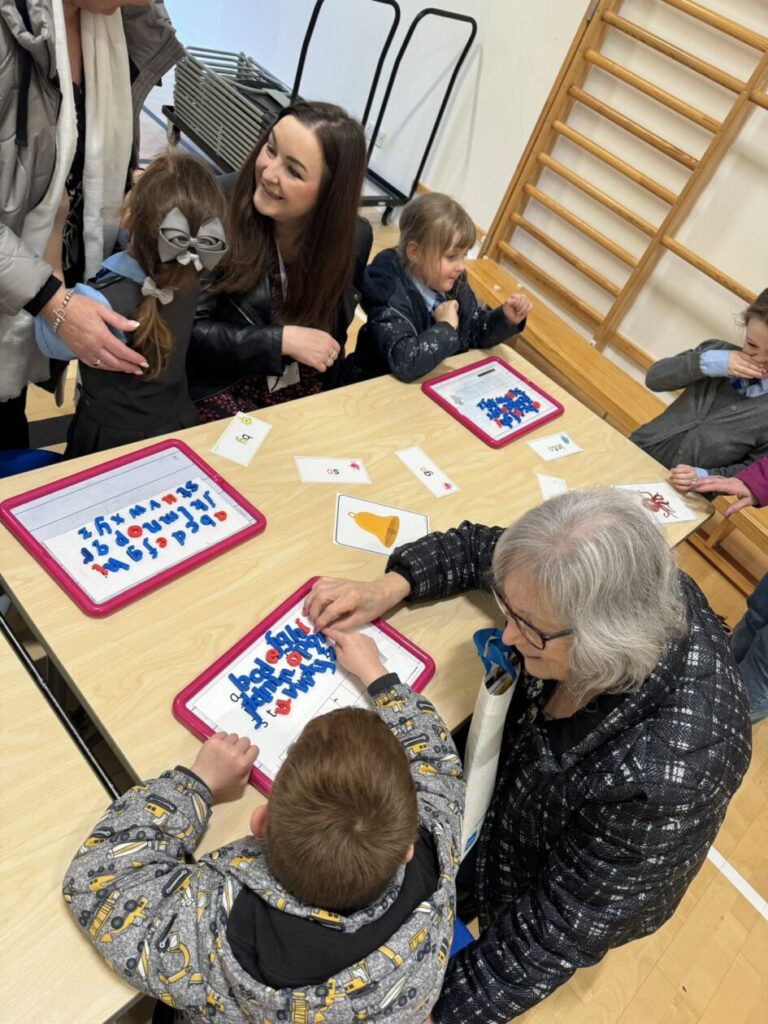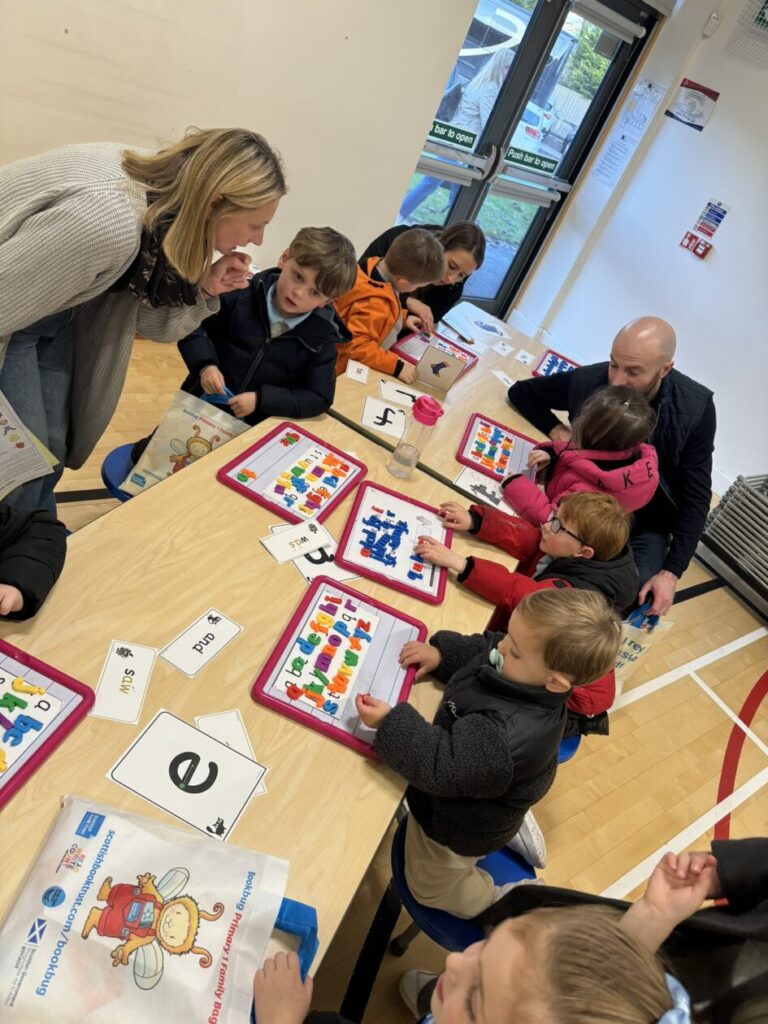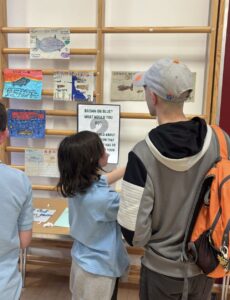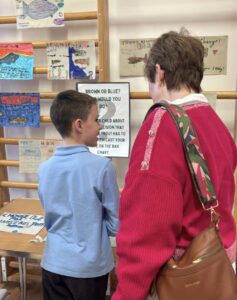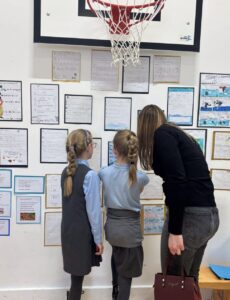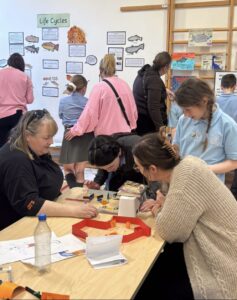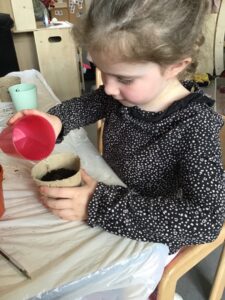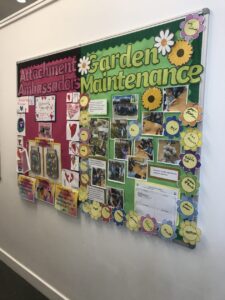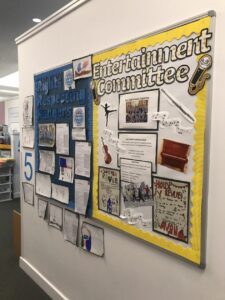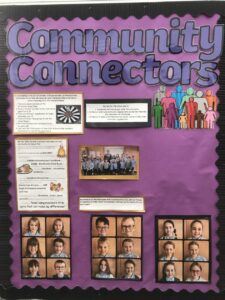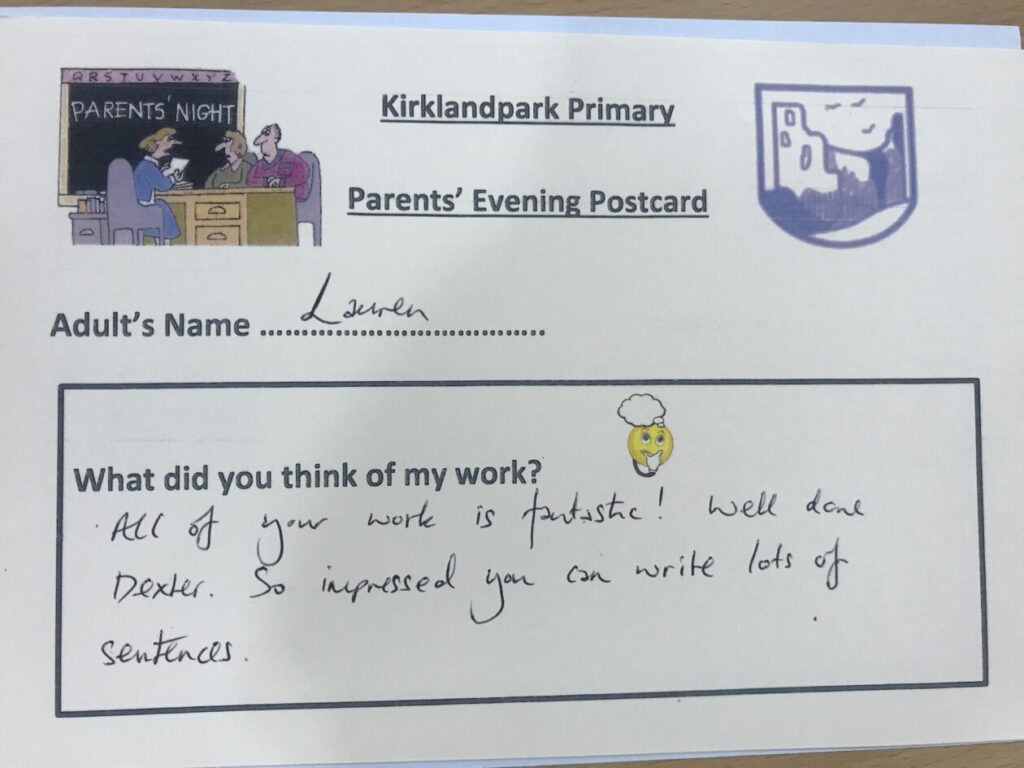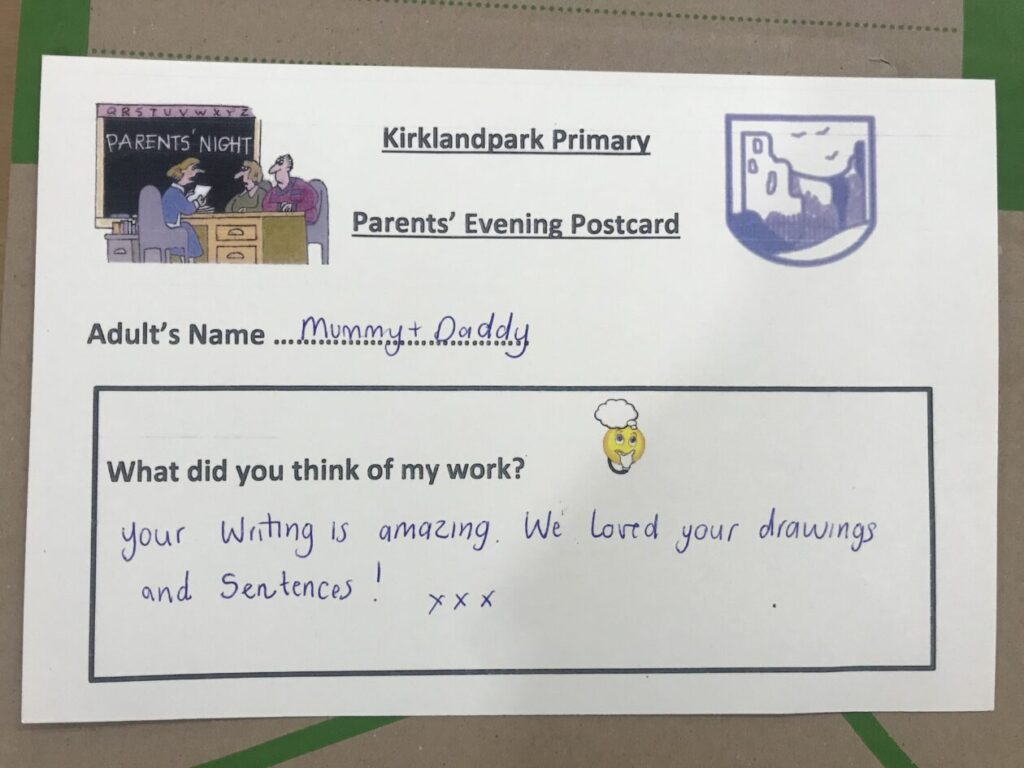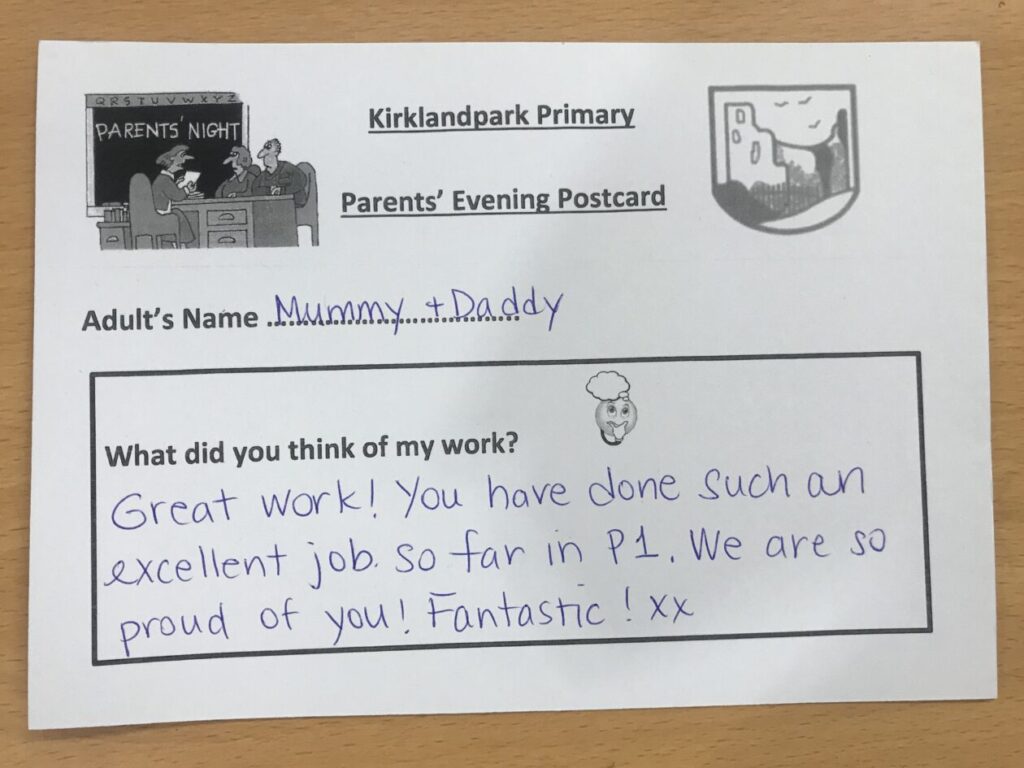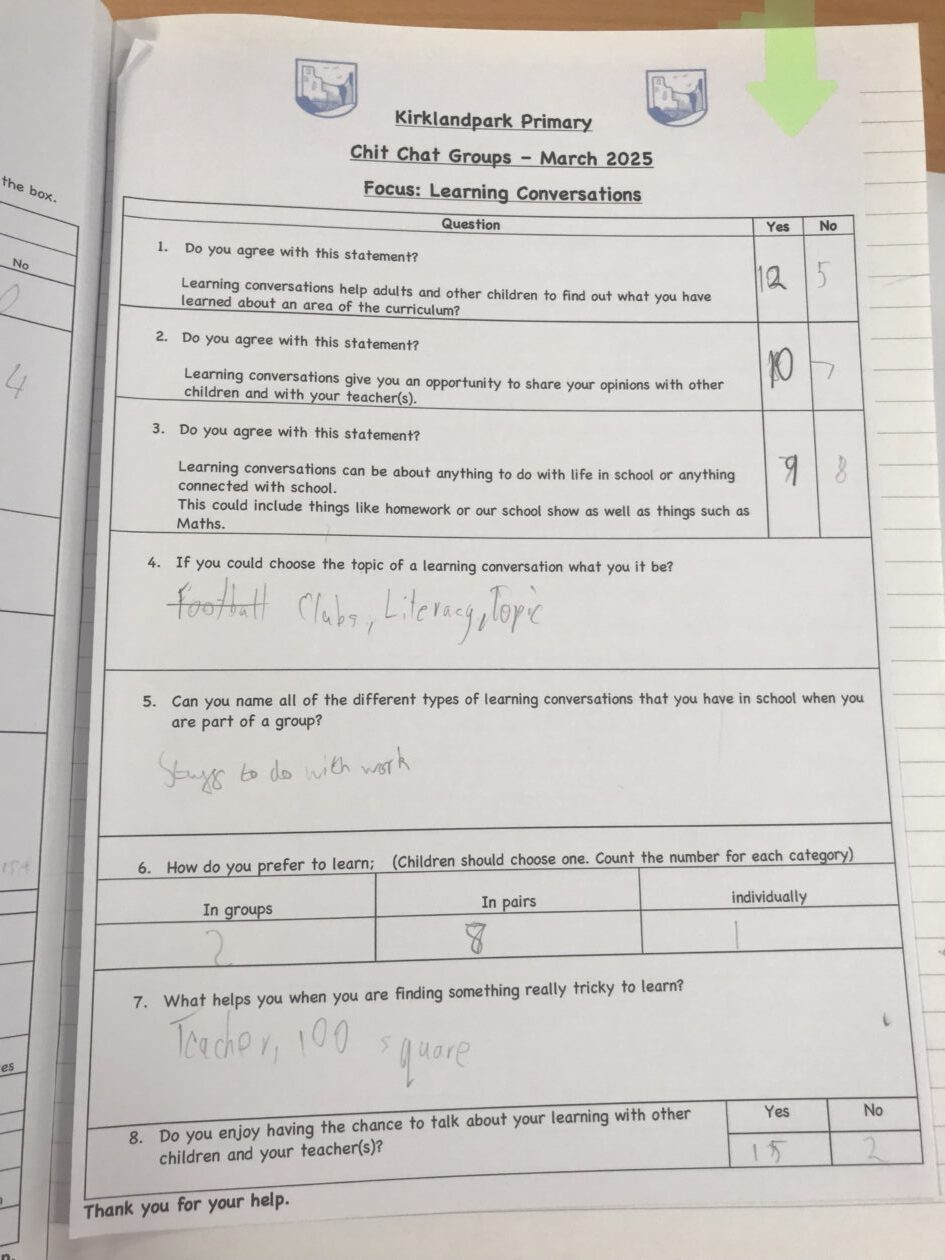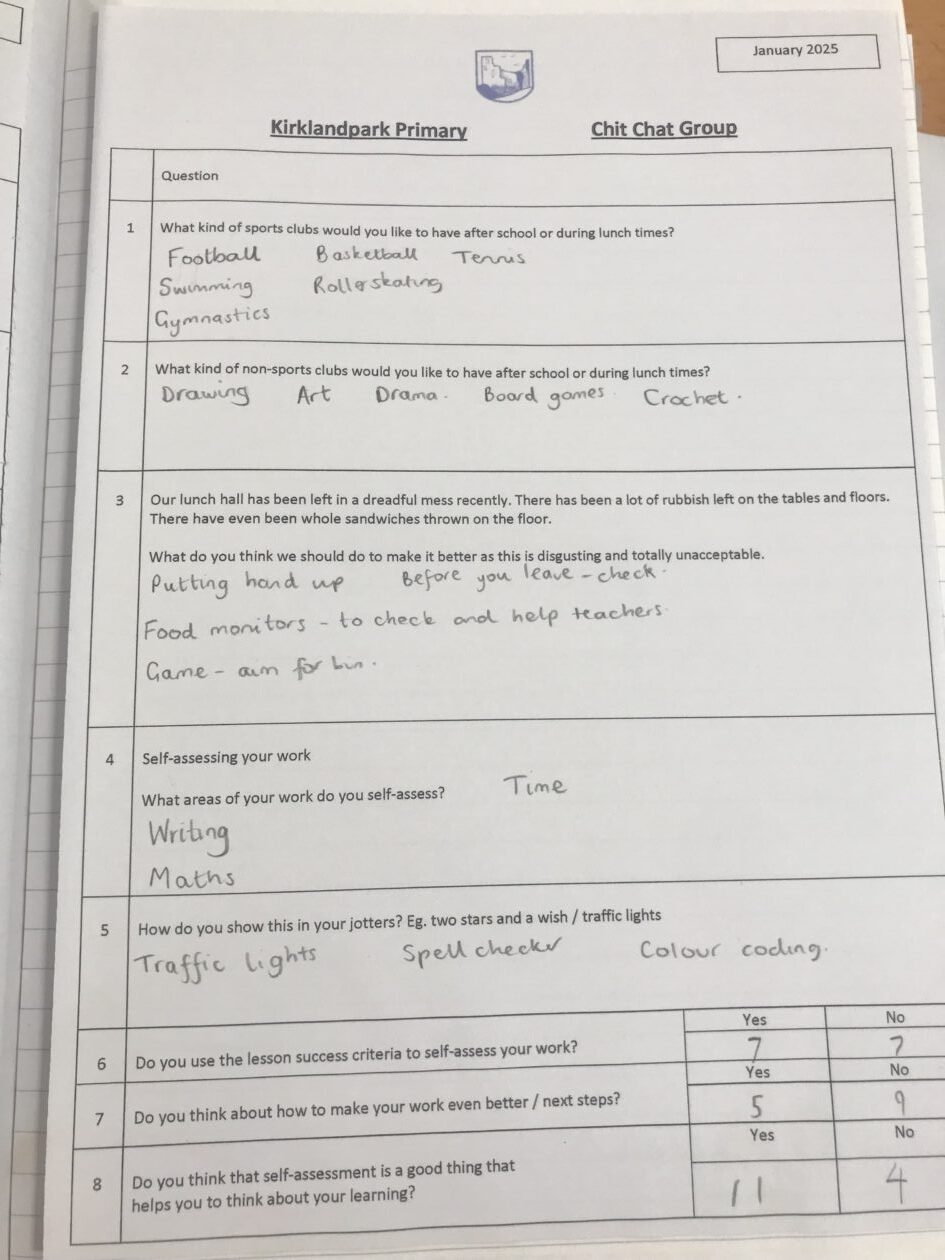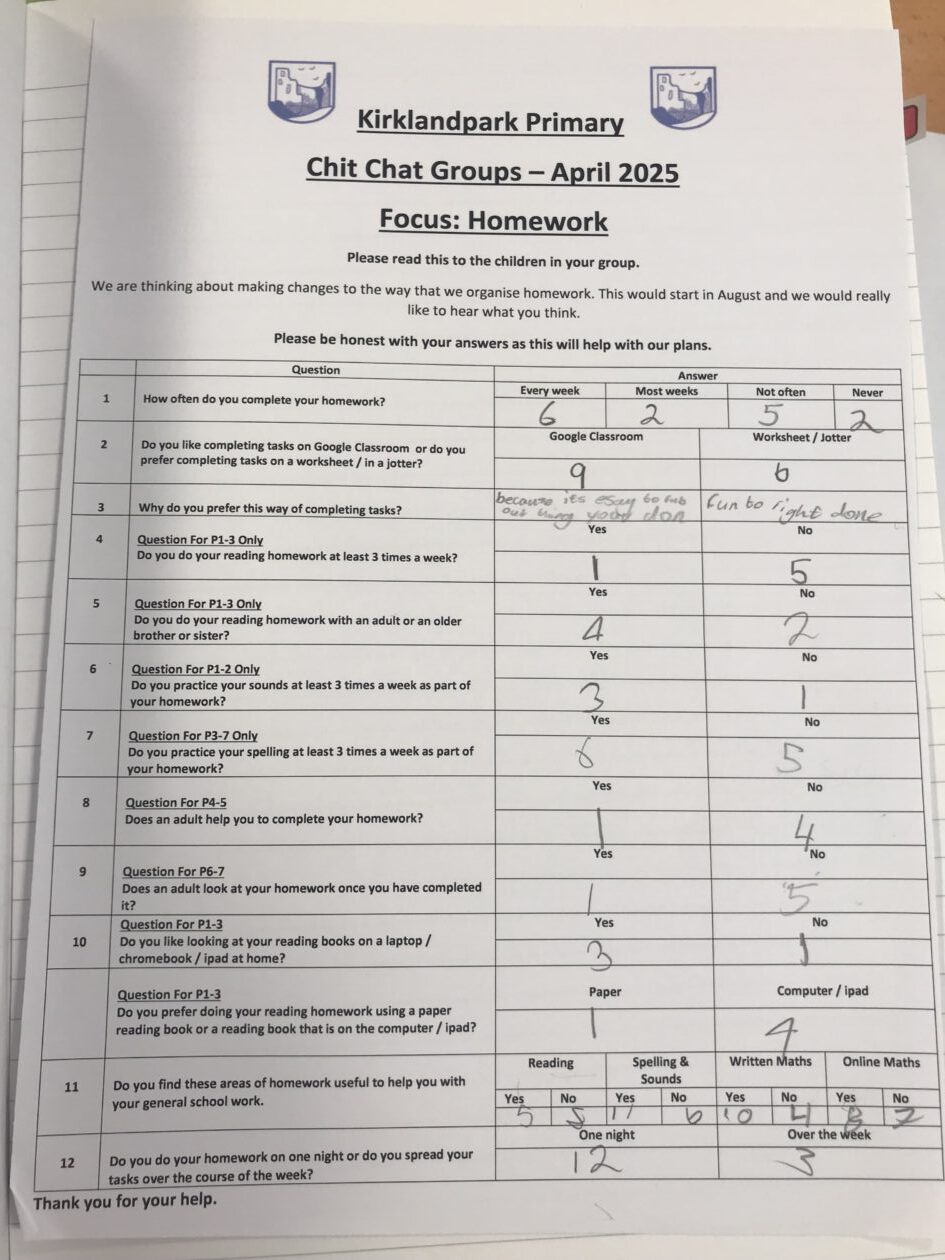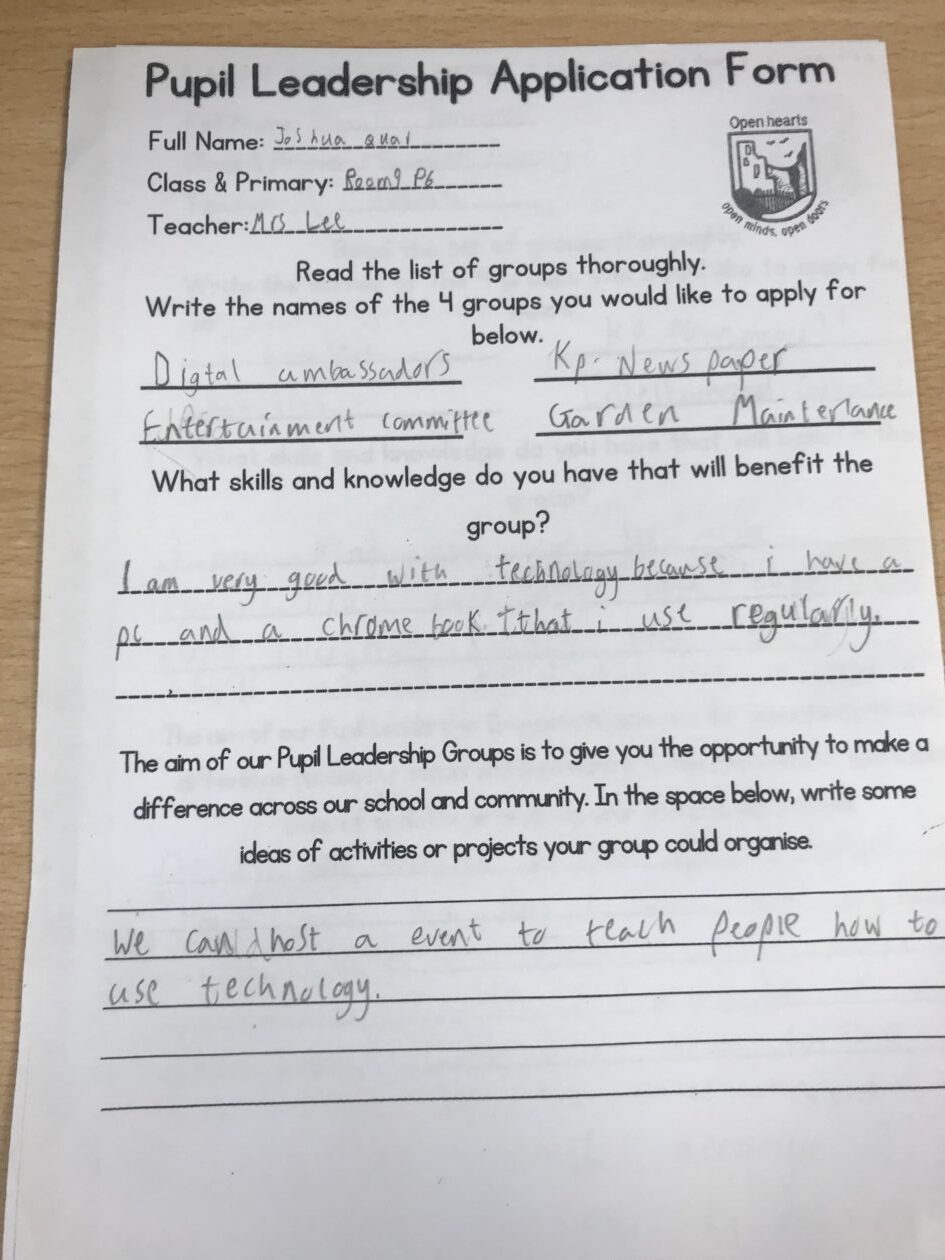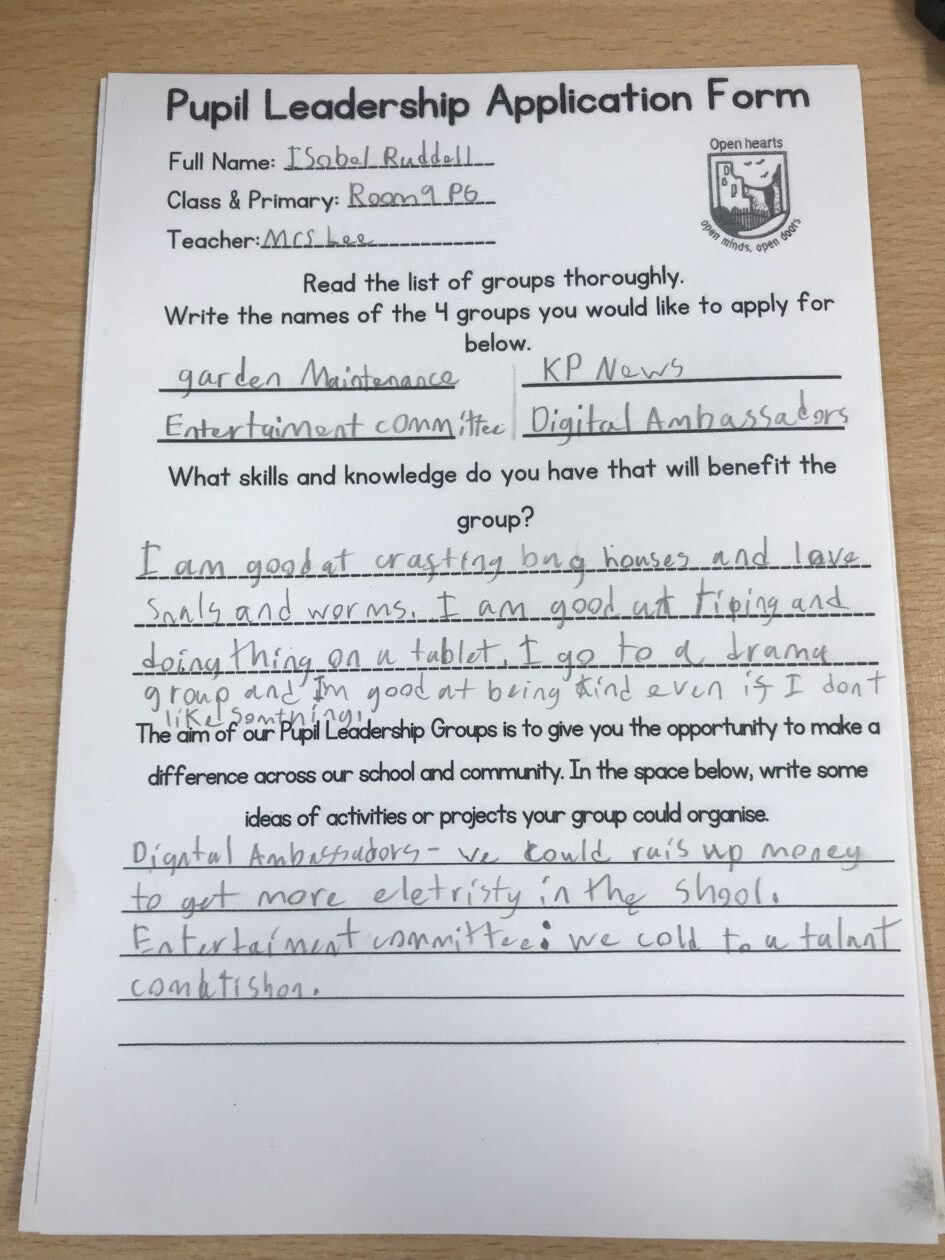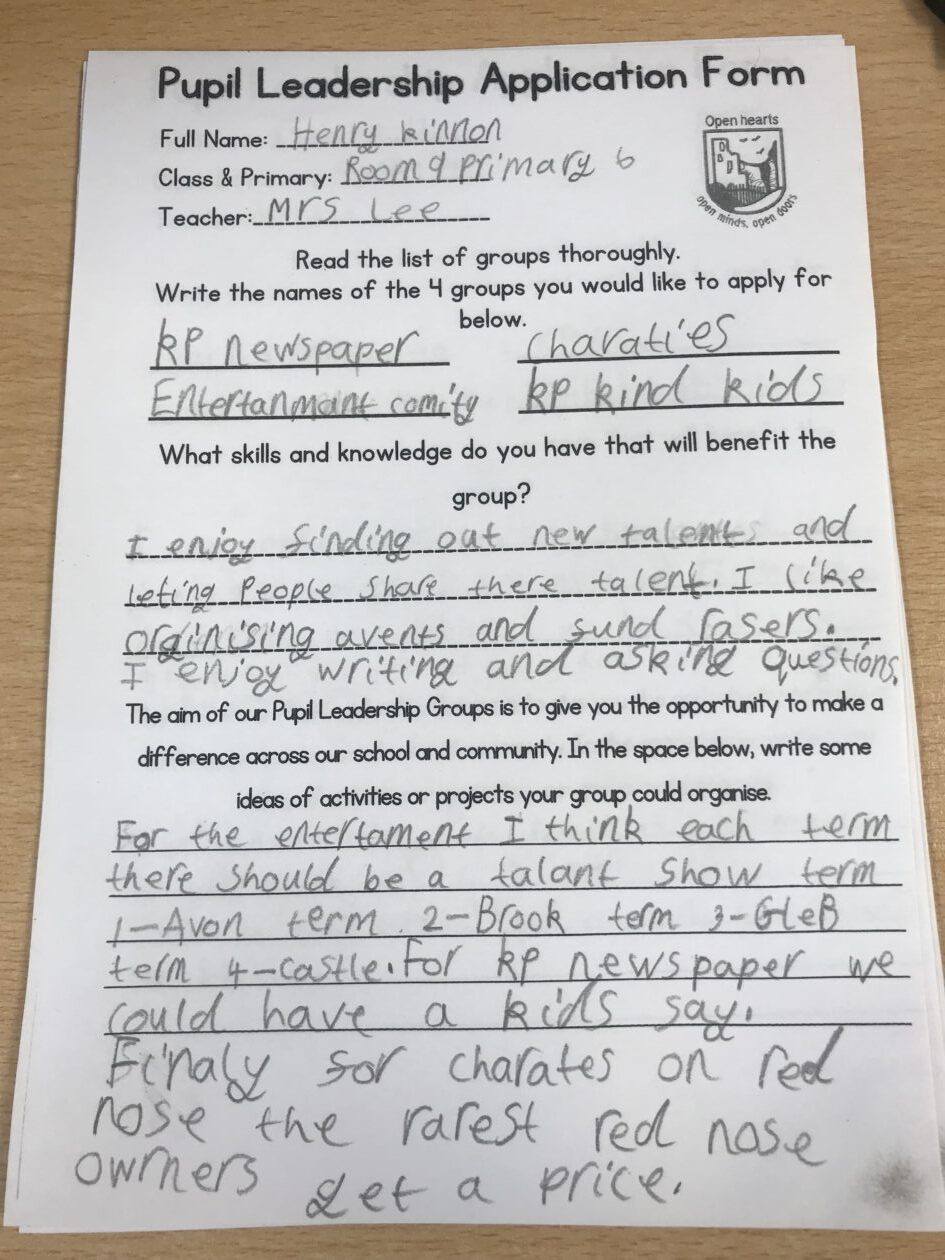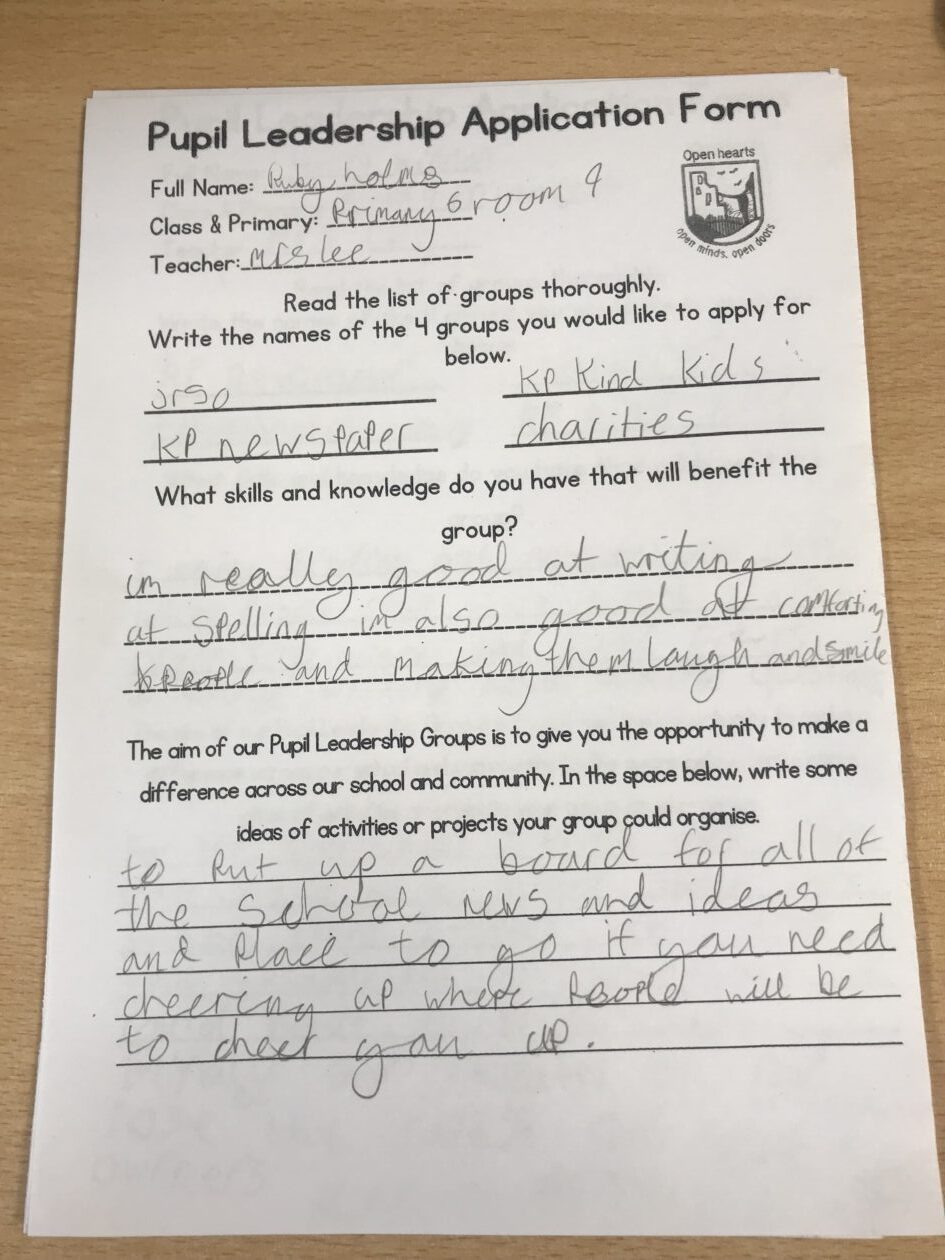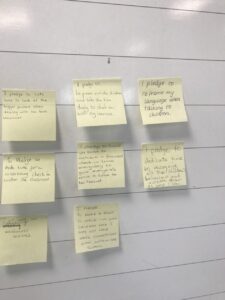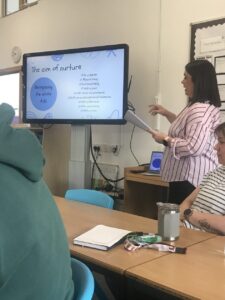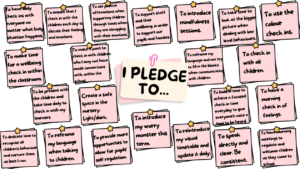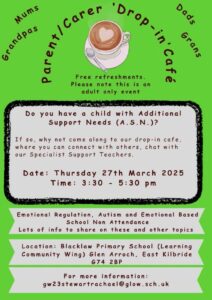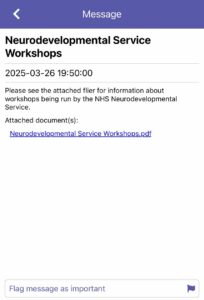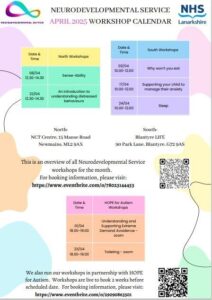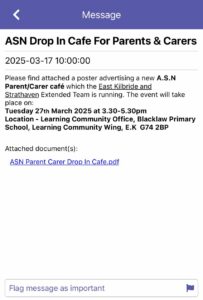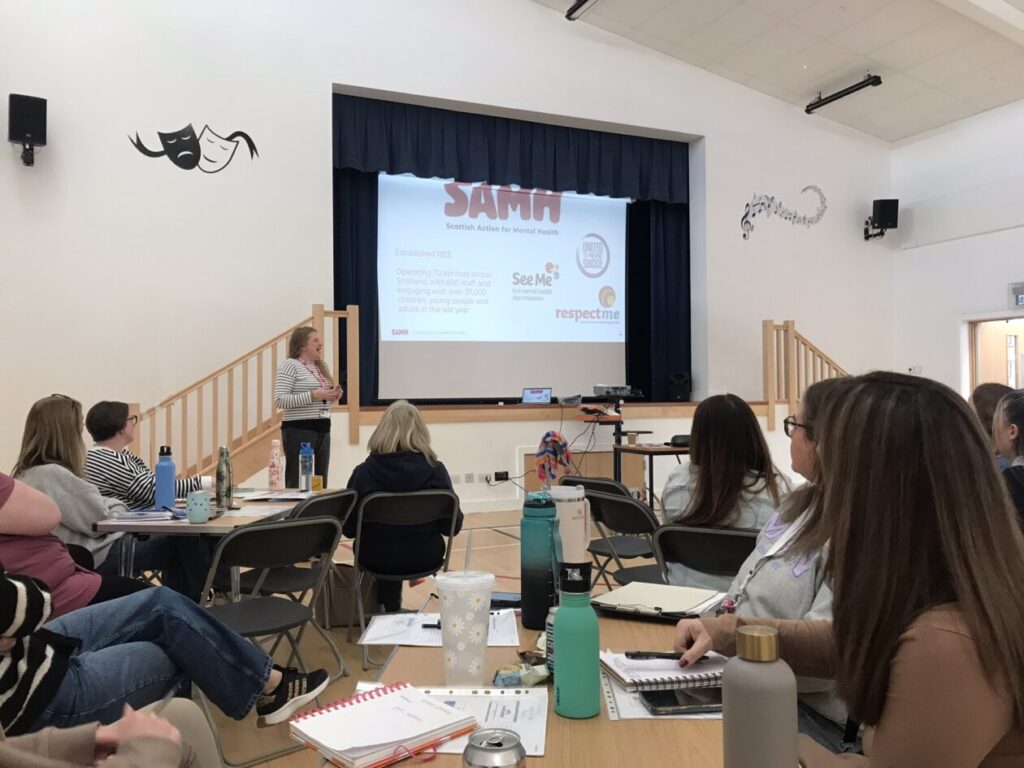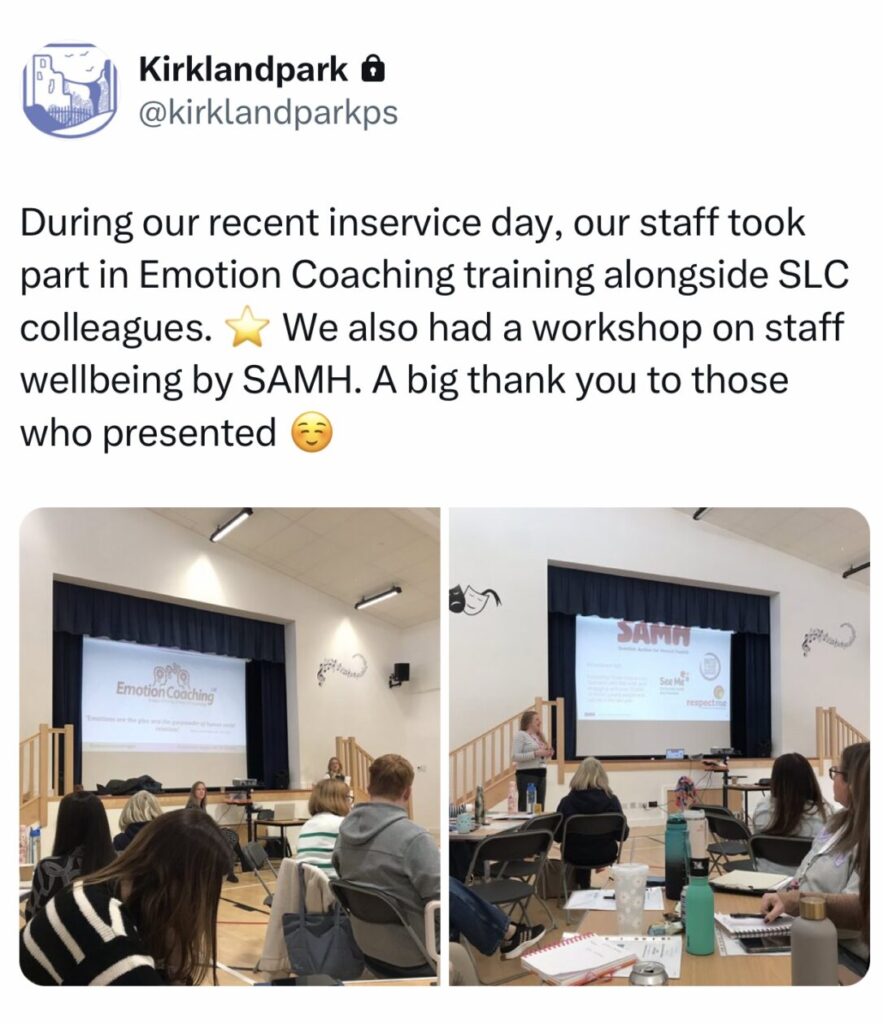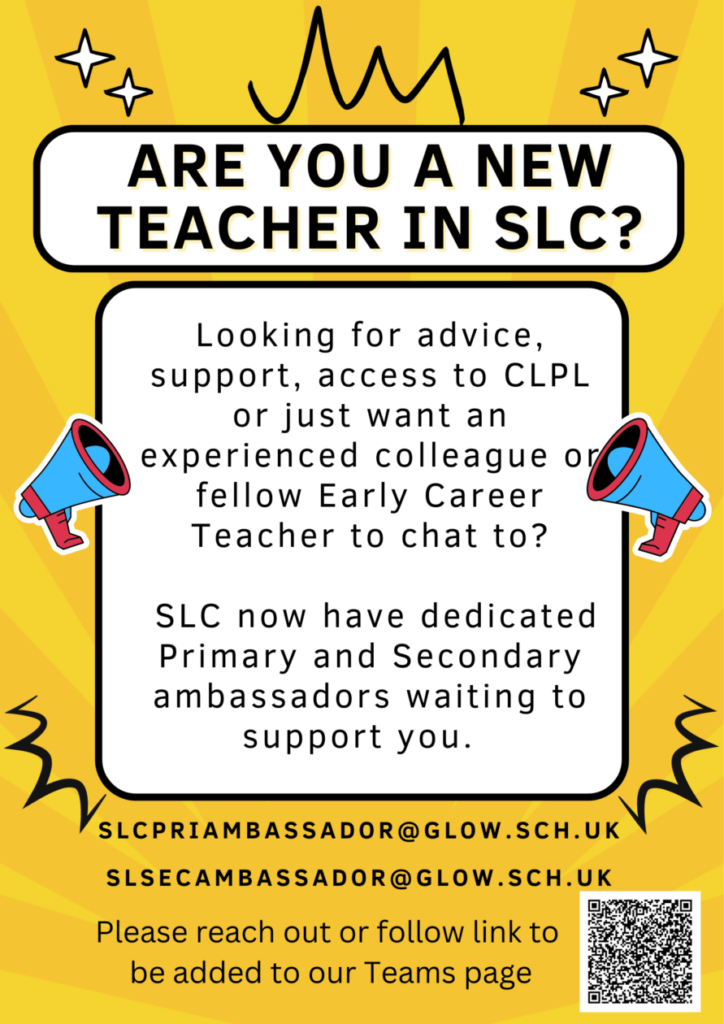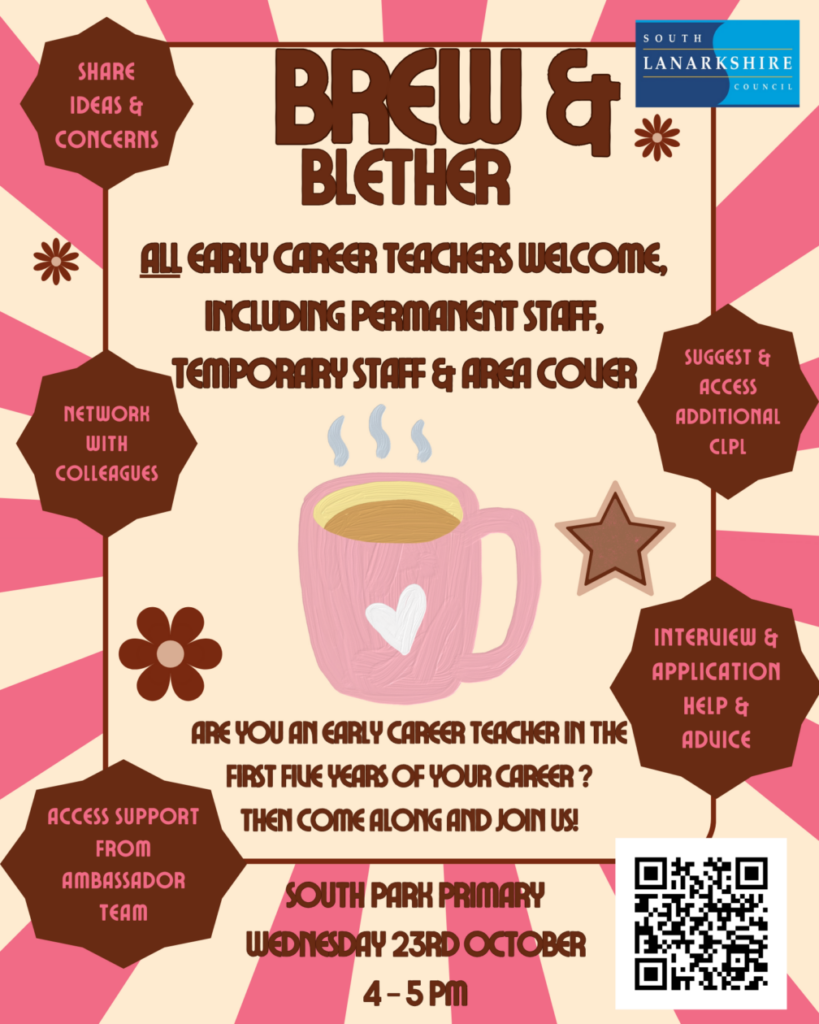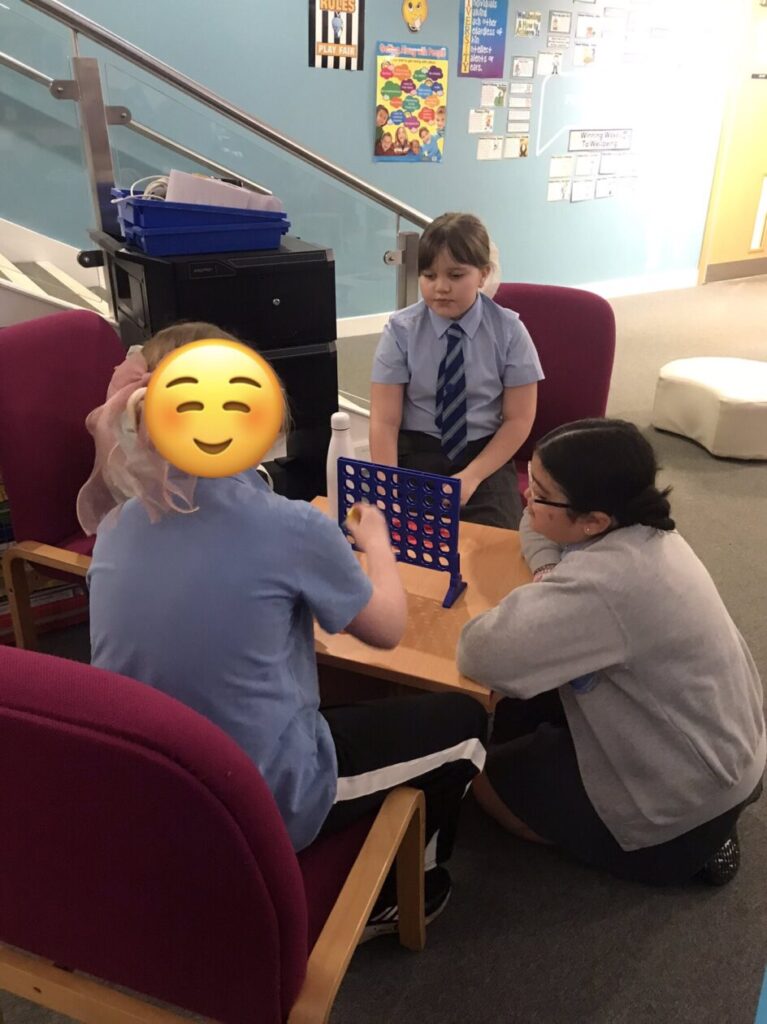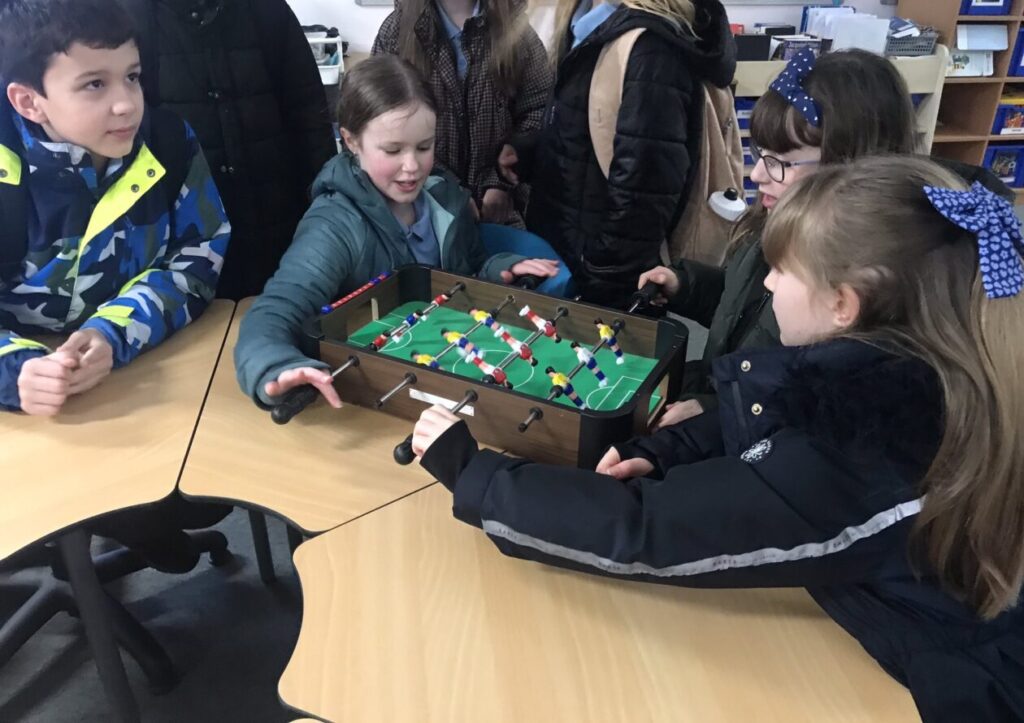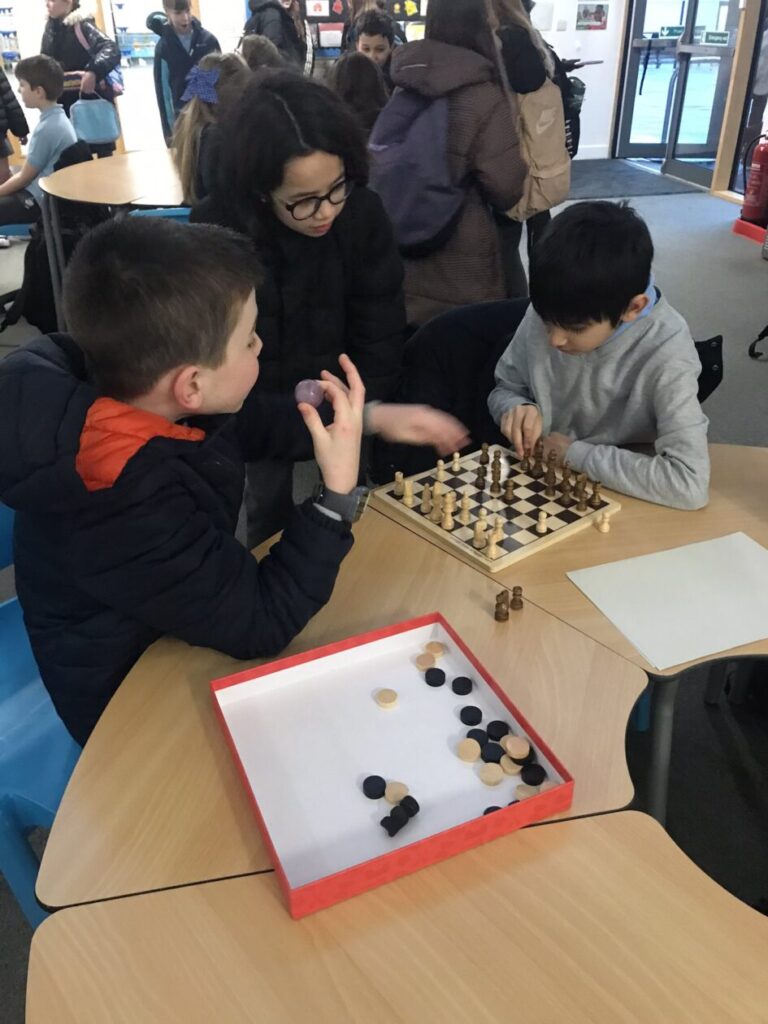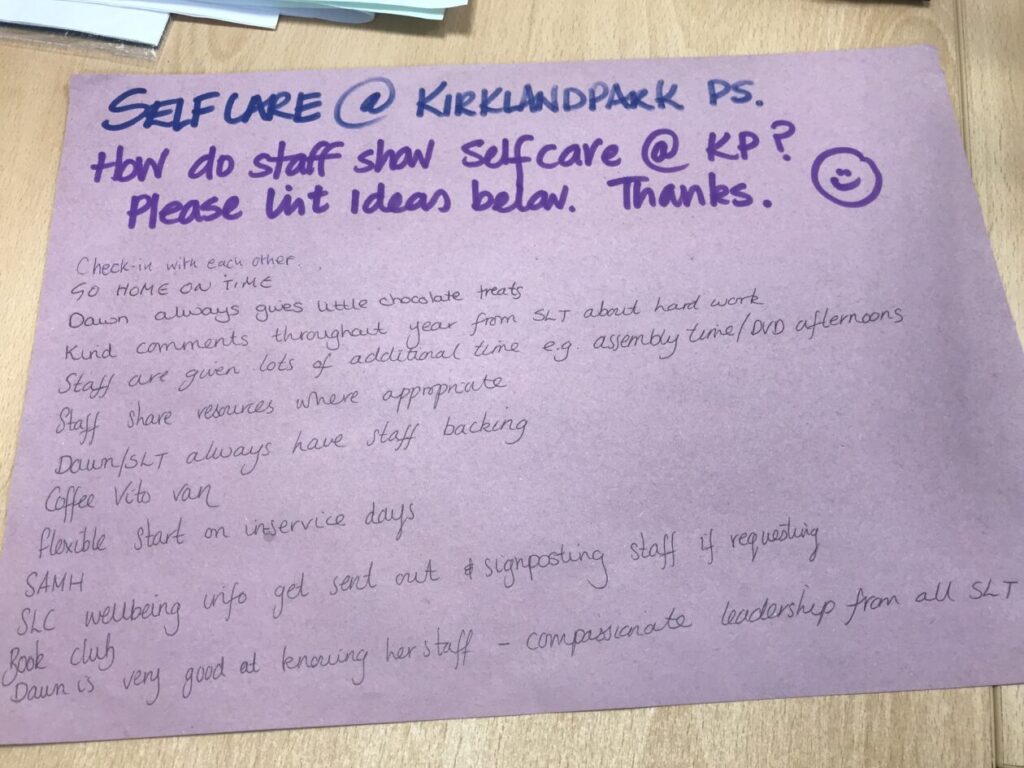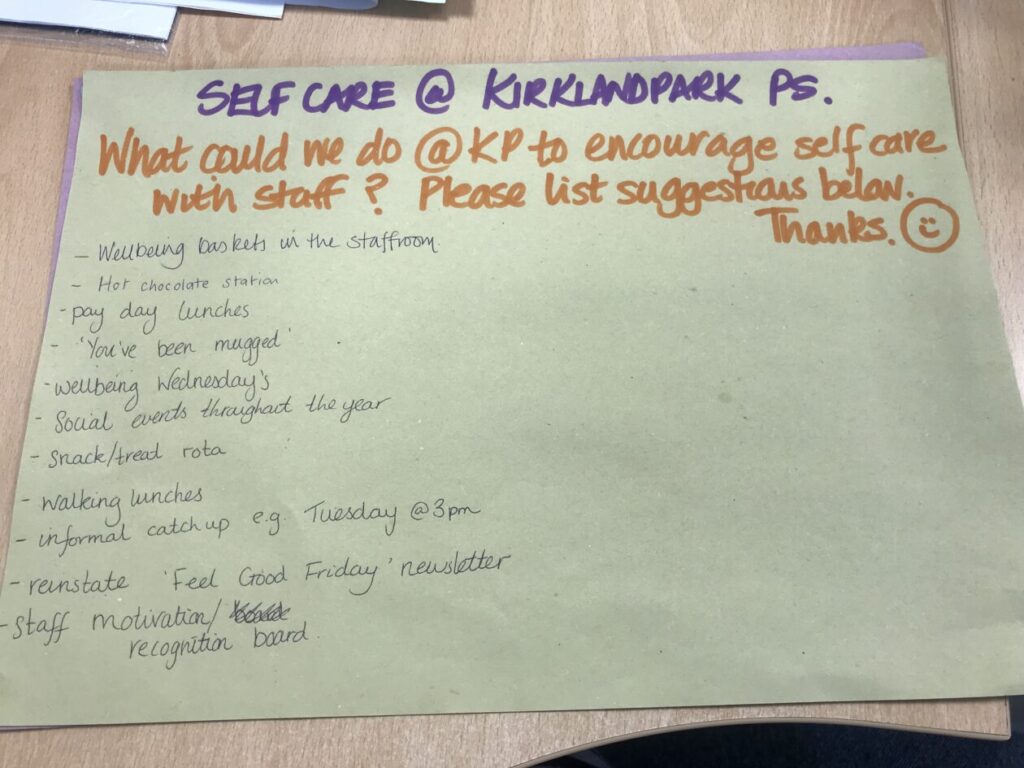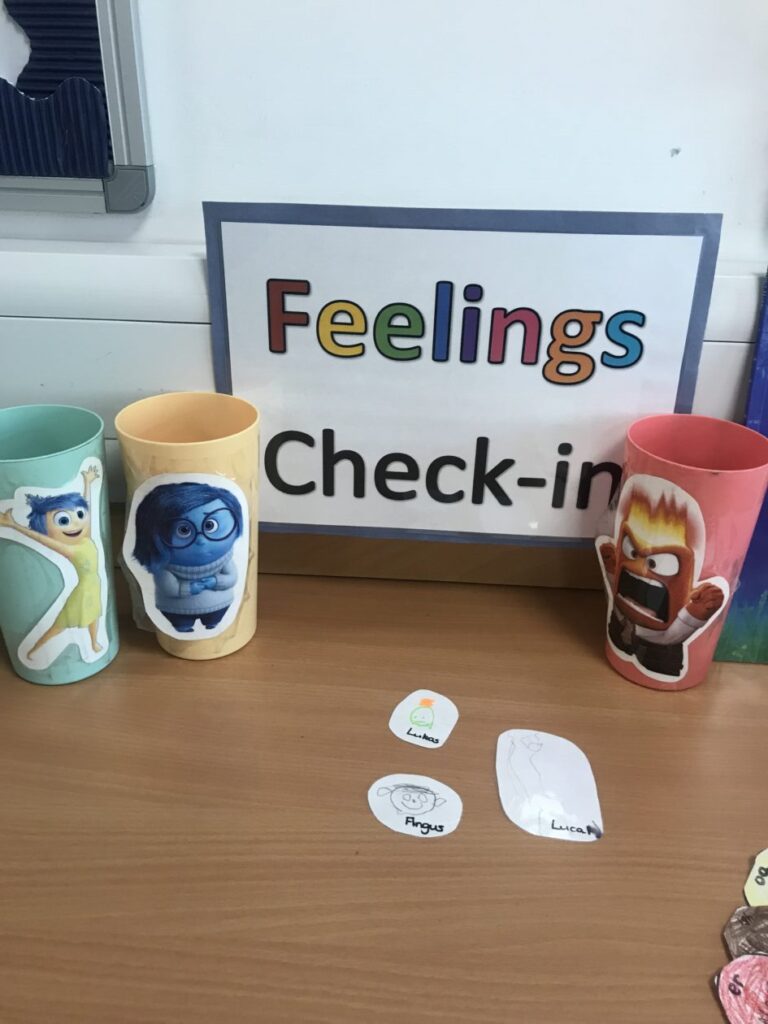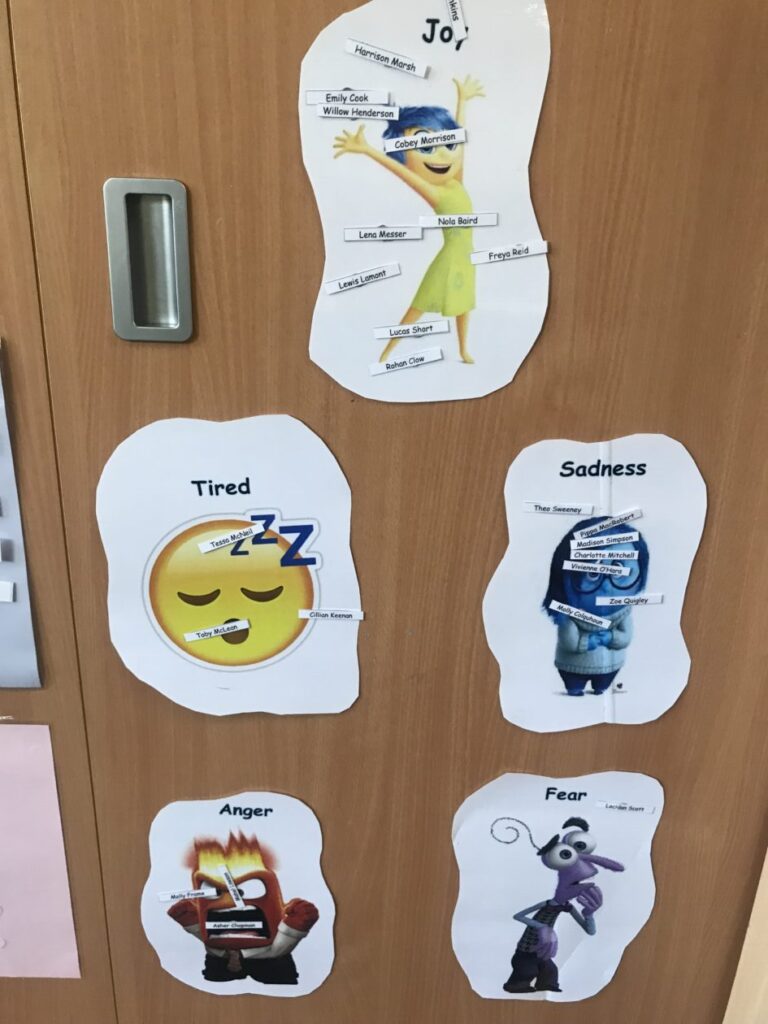Please find the evidence for the second Attachment Pledge – Hear Their Voice
Accreditation Audit
Accreditation Toolkit Hear Our Voice
Action Plan
Kirklandpark Primary Attachment Action Plan (Pledge Hear Their Voice) (3)

QI 1 The establishment has systems in place to allow pupils, staff and families to regularly contribute their views on establishment procedures, policy and practice.
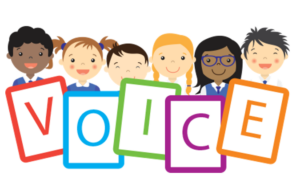
Kirklandpark School Handbook (Appendix 1)
- Our school handbook is updated each year to ensure that the information is accurate. The handbook has information for parents/carers about our school, staff, contact emails, parent council, P1 and P7 transition, PEF and equity, ASN, SLC Attachment Strategy and PPRUDB. Within our handbook, pupils voice is incorporated, with children giving their views about our school and the learning that takes place.
Kirklandpark-PS-Handbook-2025-2026 (Appendix 1)
Kirklandpark School Website (Appendix 2 a-c)
- Our school website is updated regularly and has information about ways in which our parents/carers can communicate with our school. Information about our school app and our X/Twitter account is available for parents on the website, which are two ways in which we enhance parental engagement and make links with our families. Each class teacher has created a Google Classroom, where all the children in their class are added. The class teachers monitor Google Classroom for any communication from parents and respond via this platform. The class teacher post homework as well as class/school messages on the stream of their Google Classroom. This is explained to parents at the beginning of each year and all parents are given information/helpful hints to be able to access Glow and Google Classroom are also on our website.
School Website- School App Info (Appendix 2a)
School Website- X Twitter Information (Appendix 2b)
School Website- Google Classroom Communicatio (Appendix 2c)
Email Correspondence with Parents (Appendix 3)
- We provide support for children who find transitioning from home to school, for a variety of reasons. We initially had a phone call, listened to the parents’ concerns and tried a few different strategies to help in the mornings. These works for a short time but we needed to discuss things further with the parent and child. This evidence will hopefully demonstrate our open-door policy, individualised plans for children, additional time given to child and parent and continuous check-ins.
Email correspondence with a parent (Appendix 3)
‘Hear Our Voice’ Staff Questionnaire (Appendix 4)
- At the beginning of our ‘Hear Our Voice’ pledge, a staff questionnaire was issued to gain the views and opinions across our team. Feedback was positive with many members stating that we provide many opportunities for pupil voice and this is embedded across the school. Staff also agreed that parents are consulted regarding pedagogy, policies and procedures, however this is an ongoing process. Staff felt that their voice is valued, but again this should continue to be reviewed and developed to enhance staff wellbeing.
Hear their Voice Staff Questionnaire Results (Appendix 4)
Kirklandpark Parent Council (Appendix 5a & b)
- Our Parent Council attend our P1 transition events to welcome new parents into our school and discuss their role within our establishment. They send out regular updates to keep our parents/carers involved in changes that are happening across the school and in the local community.
Parent Council Introduction P1 (Appendix 5a)
Transition Parent Council 2 (Appendix 5b)
Parent Council Initiative- Smart Phone Free Childhood (Appendix 6)
- Recently, our parent body have voiced concerns over the use of smart phones in our young people and the impact on mental health. One parent brought this to our Parent Council meetings and other parents were consulted about a movement called ‘Smart Phone Free Childhood’.
SFC letter to parents (Appendix 6)
Kirklandpark Nursery Coffee and Chat (Appendix 7)
- Our nursery hold a termly ‘Coffee and Chat’ session, where they invite our parents/carers in for discussions around pedagogy, practice and policy. Issues around parental engagement and fundraising are also discussed so that our families have their say.
Nursery Coffee and Chat Minutes (Appendix 7)
KP Brew and a Blether Sessions (Appendix 8)
- Through discussions with Julie Kiddie (Educational Psychologist) a parent workshop was organised to discuss a variety of topics. This was to provide a safe space for parents to come along, have a cup of tea and talk about their concerns, ask questions related to various topics and seek advice. We have an open door policy at Kirklandpark, and we strive to work together with our families to improve the wellbeing of all pupils.
Brew and Blether Letter (Appendix 8)
Meet the Teacher (Appendix 9a&b)
- We have a Meet the Teacher event every year in the first two weeks of term. This time allows for the parent to meet the teacher, see where their children sit and works and get a tour of the new classroom/school area where their children will be spending most of tehri day. This also gives the teacher a chance to introduce themselves to parents in an informal manner.
Meet the teacher information on Parent Portal (Appendix 9a)
Meet the Teacher Letter (Appendix 9b)
Parental Workshop- Read & Write (Literacy/ASN) (Appendix 10)
- Parents and carers for our pupils with ASN were invited to attend a workshop hosted by R. Thomson (Development Officer Digital) on how to use the ‘Read & Write’ resource. Many parents commented that having the digital tool will help lower stress levels and anxiety around Literacy for their child, and parents felt empowered to support their child at home using the resource.
Parental Workshop- You + Me (Numeracy) (Appendix 11)
- Parents and carers were invited to attend our You + Me Numeracy sessions, hosted by our Acting PT and P6 teacher. During the sessions parents learned about various strategies they could use within different areas of maths to support their child’s learning at home. The had the opportunity to ask questions to staff and work with their child on games and activities.
You + Me Parental Workshop Letter (Appendix 11)
Parental Consultation- RSHP (HWB) (Appendix 12)
- When making changes to our RSHP programme, we presented to our Parent Council members about how this would be implemented across P1-7. Our parents had the opportunity to view the resources that would be used, discuss the content of the lessons, ask any questions or raise any concerns about moving forward with these outcomes for HWB. Our council members were very supportive and shared with the rest of our parent body.
RSHP-Parental Information Session (Appendix 12)
Parental Workshop- Monster Phonics (Appendix 13)
- After noticing a dip in our spelling attainment in P1-3, our staff had spoken about changing the programme we use within our infant department. After researching resources available, our staff decided on the Monster Phonics programme. Holding a monster phonics station during parents evening allowed our families to be consulted about the programme and see a sample of the resources that would be used. After positive feedback we moved forward with Monster Phonics, starting by hosting a parental workshop to model how spelling/phonics will be taught across Early and First level.
Parental Workshop- Dyslexia Champions (Appendix 14a&b)
- Working alongside our specialist support team, we hosted a parental workshop for our Dyslexia Champions, who work with E. Buchanan once a week on ways to support their learning and discuss what having dyslexia means to them. Each child in unique and giving our pupils a voice to highlight strategies that work for them, helps staff break down barriers to success.
Parental Workshop- Dyslexia Champions (Appendix 14a)
Parent Showcase Presentation (Appendix 14b)
Pupil Learning Showcases (Appendix 15)
Pupil showcases are a yearly event where parents can attend and view their children work, observe presentations and ask questions. They are an informal opportunity for parent and child to participate in activities linked to certain curricular areas. The showcase is also an opportunity for children to take ownership of their learning as these showcases are organised and led by the children themselves. They develop valuable skills in team work, communication and build confidence and self-esteem. An example of these would be our P6 showcase on ‘Powering the Future’ and our P5 ‘Clyde in the Classroom’ topic.
R9 and R10 Showcase. (Appendix 15)
NSPCC/Respect Me Workshops (Appendix 16a&b)
- Parents have been informed of various organisations attending the school to discuss important issues with the children. Pupils are given opportunities to ask questions to the visitors as well as participate in class discussions after the events.
Respectme Visit to School (Appendix 16a)
speak-out-stay-safe-parent-carer-letter (Appendix 16b)
Equine Therapy Letter (Appendix 17)
- As part of the supports and interventions put in place, and through many discussions with one set of parents a referral was made to a business to request a block of sessions of Equine Therapy for a child in our care who was having difficulties socially and in building relationships.
Exchange Counselling Service (Appendix 18)
- A number of referrals have been made for families to the ‘Exchange’ Counselling service. These referrals have been made after meetings and discussion with the parents and children in question. Hearing from the children and parents has been the heard of discussions.
Exchange Referral (Appendix 18)
KOOTH- Mental Health Support (Appendix 19)
- We have had discussions with parents who are struggling to talk to their children about the mental health and have found difficulties engaging their children in discussion regarding their emotions. The information sent through to the families was just one avenue we discussed.
Pupil Voice Learning Videos (Appendix 20)
- Our pupils enjoy discussing their learning in class and often record videos to share with their parents/carers. Pupil voice is embedded at Kirklandpark and a high priority for our staff. Children regularly discuss their learning, highlighting how they feel, what they want to learn more about and pinpointing things they need to improve on.
Pupil Voice Video (Appendix 20)
Peer School Review 2025- Pupil Voice Focus (Appendix 21)
- As an establishment, we took part in a Peer School Review with a focus on showcasing pupil voice in our school. Staff had the opportunity to meet with colleagues in a different SLC learning community and discuss how we empower our pupils to share their ideas, views and opinions. Staff also discussed how we could continue to improve this moving forward in term 4. After our observations from our QLO and staff from Robert Owen Memorial, we received positive feedback and encouraging comments.
Nursery Learning Journals (Appendix 22 a&b)
- Sharing the learning of our nursery pupils through the Learning Journals app provides opportunities for key workers to discuss activities, linking these to the CfE benchmarks. Within the journals there is a section for pupil voice, allowing the children to give their views on the activities. Parents also have the chance to comment or like posts to feedback their opinions to our staff.
Nursery Journal Comments (Appendix 22a)
Parental Engagement Nursery (Appendix 22b)
Staff Consultation- School Improvement Plan 2025/2026 (Appendix 23)
- Staff are consulted about our School Improvement Plan (SIP) to highlight curricular areas that they feel need reviewed and suggest ways in which we can raise attainment. Our HT recently sent out a Google Form to all staff to inform our SIP for 2025/2026.
Staff Questionnaire SIP (Appendix 23)
Pupil Voice Committees (Appendix 24)
- Pupils from nursery to P7 are involved in our pupil committees that meet at the end of each month to discuss improvements to our school. Pupils had their say on which committee they would like to be a part of my sending in their application form at the beginning of the year. Committees have a notice board, updating our pupils, staff and visitors on recent information discussed at their meetings. Pupils also present during assemblies to showcase the progress of the committee.
ASP Reviews (Appendix 25a&b)
- We have ASP reviews termly where the children’s views are taken into account and added to the ASP before this is sent home to parents along with a letter offering them an opportunity to attend a meeting with the class teacher to discuss the targets and evaluation as well as the next steps and strategies in place for their child.
ASP Review Letter (Appendix 25a)
ASP reviews 2024 Term 4 & Term 1 (Appendix 25b)
Responsive Planning (Appendix 26)
- Children are asked about which topics they would like to learn about and after selecting this topic, the class teacher will provide opportunities to the children to discuss the topic and then as a class create a mind map representing the aspect of the topic they already know, aspects they would like to learn and any questions, they may have which they would like answered.
Room Four Responsive Planning for IDL Topic (Appendix 26)
Parents Evening Postcards (Appendix 27)
- Our parents get the opportunity to look through their child’s work during parents evening. Within the folders, their child has completed a postcard with a message for their adult of what they want them to look at. The parents respond to their child, giving their feedback on their work. Our pupils then read the feedback the next day in class and discuss with their class teacher.
Pupil Chit Chat Groups (Appendix 28)
- At the end of each month, our P7 pupils host a chit chat group to gather information from our P1-7 pupils. Pupils get to voice their opinion about topics, such as our playground, homework, and classroom learning. We collate the results and share with our pupils, noting how we plan to make changes to improve our school from their feedback.
Pupil Committee Application Forms
- Our pupils got the option of what committee they would like to be a part of. Pupils had to complete an application form, giving reasons why they would want to be part of certain leadership groups and what skills they would bring to the group. They also made suggestions of activities the group could take the lead on.
QI 2 All members of the establishment are given opportunities to contribute to embedding an Attachment-Informed, Trauma Sensitive approaches.

Attachment Parental Workshops (Appendix 30 a-e)
- We hosted a wellbeing workshop for parents/carers at Kirklandpark and our local learning community. We had a variety of guest speakers discussing topics that could support the wellbeing of their child and inform them of attachment/nurture.
Wellbeing Workshop. (Appendix 30a)
Supporting Your Child’s Wellbeing. (Appendix 30b)
Kirklandpark PS Intro to EC – Workshop for Parents. (Appendix 30c)
The Six Principles of Nurture Parent Workshop. (Appendix 30d)
South Lanarkshire parents and carers presentation. (Appendix 30e)
Attachment Information for Parents (Appendix 31)
- We provided materials and a display for the parents at parents evening to allow them to take some information away with them and explained if they had any questions, to get in touch. We continue to update our parents regularly throughout the year on our work to become an attachment and trauma informed school, with workshops, letters and stalls at school events.
Attachment Parent Information (Appendix 31)
Parent Council- Attachment Information (Appendix 32 a&b)
- We first informed our Parent Council on Attachment in 2022 with Julie Kiddie (Educational Psychologist) and have continued to update our parents/carers over our progress. We value our parents/carers opinions and want them to have their say on how we can improve attachment and nurture within our school. Our Parent Council feedback to the wider school and share the information presented during the meetings to obtain feedback from nursery to P7.
Parent Council Meeting Minutes- Attachment Journey (Appendix 32a)
Parent Council Meeting Minutes – Attachment Journey (Appendix 32b)
Individual Strategy List- Parent Update (Appendix 33 a&b)
Individual strategy lists are used for a variety of situations e.g. ASD, ADHD, Dyslexia. The lists are created in consultation with teacher, children and parents. The strategies can be for in school, at home and a combination of both. These are passed on to the next class teacher as part of the transition process to ensure everything is in place before the child moved into their classroom. Through observation and monitoring, the strategies are regularly updated and meetings to inform parents/carers are help to discuss nurturing interventions.
Individual Strategies (Appendix 33a)
Interventions and strategies for Dyslexic Learner (Appendix 33b)
Staff Training- Attachment and Nurture (Appendix 34)
- Our staff took part in Attachment and Nurture training with SLC Development Officer Kayleigh Crawford. We explored how we can improve the wellbeing of our pupils from nursery to primary 7 and discussed how we can enhance our environments to make them more inclusive. Our staff created pledges to discuss how they would support our pupils and embed an attachment informed approach.
Nurture Interventions- Parent/ Staff Consultation (Appendix 35 a-c)
- Staff are asked to complete the initial consultation form after completing the Boxall Profile to see if a nurture intervention as an individual or in a small group would be beneficial. Information regarding nurture and nurture groups is shared with parents as part of the initial consultation. Parents are given the opportunity to contact the school and discuss their child’s needs and ask questions related to nurture as there can be misunderstanding relating to this term and how it is used in relation to the groups.
Nurture timetable (Appendix 35a)
Nurture Sessions (Appendix 35b)
Attachment Ambassadors- Assembly Updates (Appendix 36)
- Our Attachment Ambassador committee. regularly update our school during assembly. They focus on putting information about attachment and nurture into child friendly languages. They include ways in which we can improve the wellbeing of our pupils and enhance our school ethos.
Attachment Ambassador Assembly 2024 2025 (Appendix 36)
Parental Updates- Sharing Information and Support (Appendix 37)
- We regularly update our parents on our school app and Twitter/X page about upcoming workshops. The most recent ones were the ASN drop in Café by the SLC specialist support team for Strathaven and EK. The focus of the drop in was for parents to have chat about issues impacting their child and receive support from specialists and other parents/carers. The topics covered were autism, emotional regulation and emotional school based non-attendance. Another information session was shared on our platforms which supported parents on understanding distressed behaviours, issues surround eating and sleeping, extreme demand avoidance and managing anxiety in children.
Attachment Working Group Minutes (Appendix 38)
- Our Attachment working group meet to discuss next steps on our journey to ensure attachment and nurturing approaches are embedded and consistent across the nursery and school. We continue to look at the SLC strategy and guideline document, alongside the pledges to highlight possible gaps and inform our next steps.
Attachment Group Agenda (Appendix 38)
QI 3 Health and wellbeing is prioritised and there are systems in place to regularly check in with staff and pupils and provide opportunities for ongoing support.

Pupil Check Ins (Appendix 38)
- We allocate time each week to those pupils who require additional check ins with our staff. Staff use our Nurture Neuk for a quiet and safe space to discuss how they are feeling, if the child has any worries/concerns or if the child simply just wants time to chat with their teacher. The children look forward to this time with their teacher and distressed behaviour in class has reduced due to a weekly slot with our most vulnerable children.
Room 5-11 Daily Check-ins (Appendix 38)
Kirklandpark Health Month (May) (Appendix 39 a&b)
- At Kirklandpark, staff and pupils celebrate ‘Health Month’ in May. Staff plan a daily health focus from P1-7 and implement a range of lessons linked to social, emotional and physical health. Activities such as yoga, fitness, positive affirmations and mindfulness.
P1-3 Kirklandpark Primary Health Month (Appendix 39a)
P4-7 Kirklandpark Primary Health Month (Appendix 39b)
Mental Health Week (Appendix 40)
- In 2024, the focus for Mental Health week was ‘My Voice Matters’. We celebrated this in many different ways for both pupils and staff. We had ‘Voice Violets’ and ‘Wellbeing Wednesday’ activities. In addition to this SAMH visited our pupils for a ‘Lets Connect’ session.
- ‘My Voice Matters’ Mental Health Week 2024 (Appendix 40)
Children’s Mental Health Week 2025 (Appendix 41 a&b)
- As part of Children’s Mental Health week in February, a range of activities were planned for pupils across the school to raise awareness of mental health and providing our pupils with the strategies to regulate their emotions to help improve their wellbeing. We had parents and members of the community support our pupils throughout this week with implementing lessons, such as, Therapets, Kindness workshops and Universal Connections (socialising supporting wellbeing sessions).
Children’s Mental Health Week 2025 Overview. (Appendix 41a)
Mental Health Awareness Week (Appendix 41b)
Staff Wellbeing- SAMH (Appendix 42)
- SAMH visited our staff to discuss their wellbeing at our most recent in-service day. They discussed coping strategies when feeling stressed and highlighted ways to improve staff mental health. Mental health charities information was shared with all staff during this session. We also shared our in-service day wellbeing training with our parents on our Twitter/X account.
Signposting Wellbeing to Staff (Appendix 43)
- Our HT shares opportunities for staff to receive support from SLC and colleagues. Some of our staff went along to these events to chat informally to other practitioners, sharing their experiences, thoughts and feelings.
Pupil Wellbeing- Common Room Drop Ins (Appendix 44)
- To support our pupils social wellbeing, our Common Room is open to P6&7 pupils every morning. This provides opportunities for our pupils to come into school and play games with their peers at the beginning of the day. A member of staff is on hand for emotional check ins and having a quite place to go in the mornings helps the transition from home to school and reduce social anxiety for those pupils who are overwhelmed in our playground.
Staff Self Care- Coffee Vito Treats (Appendix 45)
- Our SLT regularly organise for the Coffee Vito van to visit our school for in-service days, staff meetings or training days. A little pick me up goes a long way and makes our together time more enjoyable with a tasty treat!
Coffee Vito Van Email (Appendix 45)
Staff Wellbeing- Flexible Hours (Appendix 46)
- Where possible, we try to have flexible hours for in-service days that suit the needs of our staff. Staff get the option to vote to start and finish earlier or have a later start to their morning. SLT take into consideration the views of our staff to ensure wellbeing is prioritised at every opportunity.
Flexible In-Service Day Working Hours (Appendix 46)
KP Feel Good Friday Newsletter (Appendix 47 a-c)
- Feel Good Friday staff newsletters highlights good practice at KP and shares positive news. This helps boost staff morale and motivates our teaching team.
Feel Good Friday 1 (Appendix 47a)
Feel Good Friday 2 (Appendix 47b)
Feel Good Friday 3 (Appendix 47c)
Staff Consultation- Improving Our Wellbeing (Appendix 48)
- We asked staff about how we prioritise staff wellbeing at KP. They noted that SLT have an open door policy, providing additional time during assemblies for workload/CLPL opportunities, regular check ins and signposting support all help with our wellbeing. Our team had some suggestions to continue to promote this, such as ‘You’ve been mugged’ (secret mug of treats), Wellbeing Wednesdays, payday lunches and more social time together.
Attachment Ambassadors (Appendix 49)
- The attachment Ambassadors discussed the next challenge they were going to embark on as part of their leadership group. They discussed their next steps and selected a focus on valuing contributions and interests and talents. Through discussion, they came up with providing a safe space for children who were finding the interval and lunchtimes overwhelming or difficult. Some of the children in the leadership group explained that they found the playground too busy and noisy so would like a space that was quiet and less busy. We decided on asking their classmates to vote on some activities which would be available throughout the week during these specific times. They could come along and participate in or come along and speak to the Attachment Ambassadors about anything they were worried or upset about. The children organised themselves into groups, we created a timetable and set about asking for the views and talents of their peers.
Attachment Ambassador Buddy Breaks (Appendix 49)
Staffroom Revamp (Appendix 50)
- We revamped our staffroom to make this area a more relaxing and enjoyable environment for our staff. We included ‘Grab and Go’ baskets where staff could snack on tasty treats. There is a music station and reading area for staff to relax during breaks and lunchtimes.
Emotional Check Ins and Morning Greetings (Appendix 51)
- We have emotional check ins within each class and morning greetings to welcome the children into the classroom environment. Children can change how they are feeling throughout the day and this is reflected upon with the class teacher and discussed.
